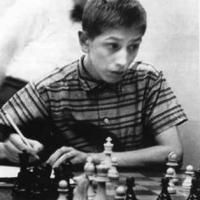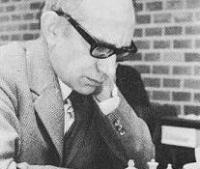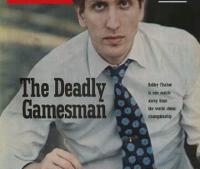
He Learned Directly from God
Robert James (Bobby) Fischer was born at 2:39 pm on March 9, 1943 in Chicago, Illinois (Michael Reese hospital) by the banks of Lake Michigan, his mother Regina Wender Fischer Pustan (born in Switzerland of Jewish parents on March 31, 1913 and raised in St. Louis). For the father, the birth certificate said Hans-Gerhardt Fischer (born in Berlin on September 28, 1908). Hans-Gerhardt was a German biophysicist from Berlin (Hans and Regina married on November 4, 1933 in Moscow).
Regina started out in medical school in Moscow, but did not graduate. She then became a riveter at a Soviet defense plant. She later became a grade school teacher, a registered nurse, a physician (she first entered medical school in Moscow in 1933 but did not complete her medical degree), and completed a PhD in hematology. She went on to do pro bono medical work for the poor in Central America and South America. She could speak English, French, German, Russian, Spanish, and Portuguese fluently.
A 2002 article by Peter Nicholas and Clea Benson of The Philadelphia Inquirer argued that Paul Nemenyi, a Hungarian Jewish physicist, was Fischer's biological father. The article quoted an FBI report which stated that Regina Fischer returned to the United States in 1939, while Hans-Gerhardt Fischer never entered the United States, having been refused admission by U.S. immigration officials because of alleged Communist sympathies. Regina and Nemenyi were reported to have had an affair in 1942, and he made monthly child support payments to her, paying for Fischer's schooling until his own death in 1952. Fischer later told the Hungarian chess player Zita Rajcsanyi that Nemenyi would sometimes show up at the family's Brooklyn apartment and takes him on outings.
However, Regina Fischer told a social worker that she had traveled to Mexico to see Hans-Gerhardt in June 1942, and that Bobby was conceived during that meeting, They divorced in 1945 when Bobby was two years old, and he grew up with his mother and his older sister, Joan Fischer Targ (born in Moscow in 1938 and died on June 2, 1998 in Portal Valley, California of a cerebral hemorrhage). They first lived in an apartment at 1059 Union Street in Brooklyn. Later, they moved to a four room apartment on Lincoln Place (the corner of Lincoln and Franklin), in a four-story brick building. On the first floor was a candy store.
In May 1949, Bobby and his sister Joan learned how to play the game with a Chess set given to them as a present. Both, six and eleven, learned the moves from the instructions that went with the set. Even as a six-year-old, Bobby became increasingly fascinated with Chess and enjoyed enough success in solving its complexities. By age seven, he was so thoroughly absorbed that his mother became worried. "Bobby isn't interested in anybody unless they play Chess and there just aren’t many children who like it," she once said.
On November 14, 1950 his mother attempted to place an ad in the Brooklyn Eagle, looking for chess opponents for her son. The ad was never published because the editorial staff could not decide under what category to place it.
On January 17, 1951 Bobby played a game against Master Max Pavey who was giving a simultaneous exhibition and Bobby lost in 15 minutes. A few weeks later Bobby joined the Brooklyn Chess Club, headed by Mr. Carmine Nigro, and for the next few years he rarely missed a Friday evening.
In 1953, Bobby Fischer played his first Chess tournament at the Brooklyn Chess Club Championship when he was ten: he placed fifth. In 1955, Bobby scored 4.5 of 8 in a Washington Square Park Swiss tournament. He joined the Manhattan Chess club in June, 1955 and soon won the class C championship and the class B Championship.
He often was given the opportunity of playing against the Club's finest masters. Reshevsky gave a simultaneous blindfold exhibition in which Bobby competed and he was ecstatic when he defeated the Grandmaster. In July he won 2 games, drew 6 games, and lost 2 games at the U.S. Junior Championship in Lincoln, Nebraska. He took 3rd place in the U.S. Junior Speed Championship.
In March 1956, Bobby traveled with the Log Cabin Chess Club to Cuba and gave a simultaneous exhibition at the Capablanca Chess Club. His U.S.C.F. rating was published at 1726. In April he won the class A Championship at the Manhattan Chess Club. In May he played in the U.S. Amateur Championship in Asbury Park, New Jersey, winning three games, drawing two, and losing one. At thirteen, he was the youngest player in the event.
Test yourself with some examples of the budding player's tactical abilities:
[part 2]






